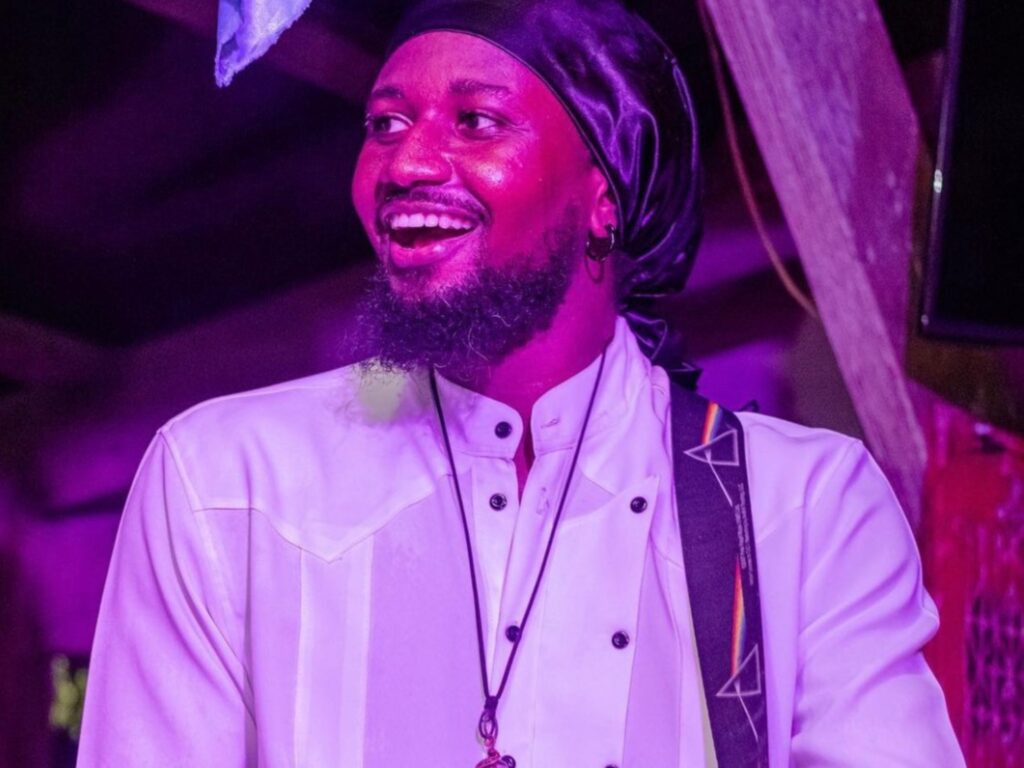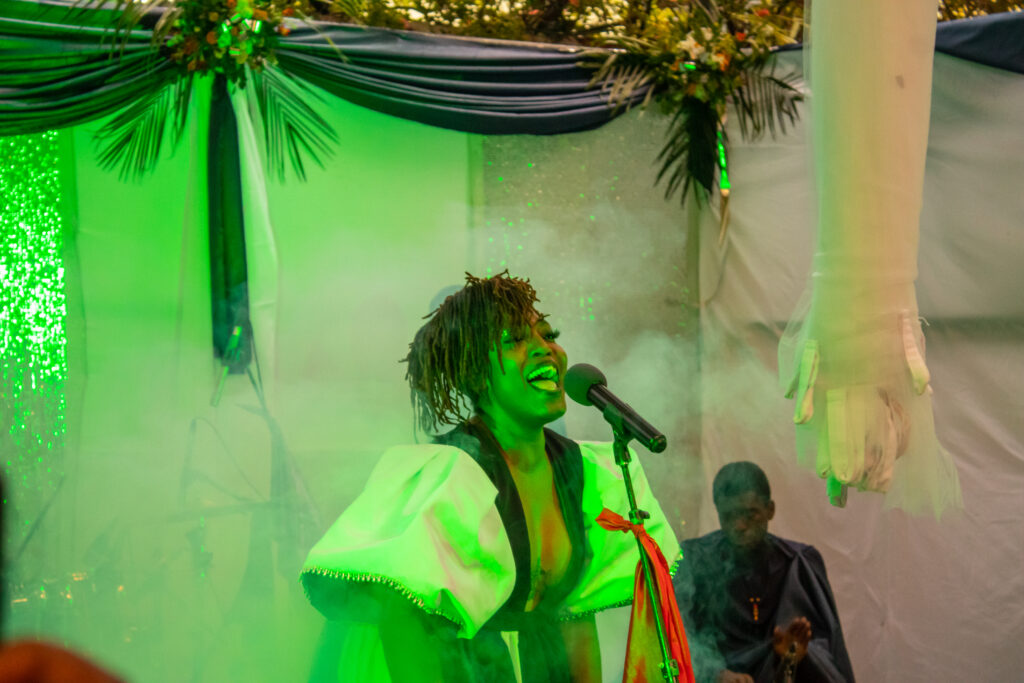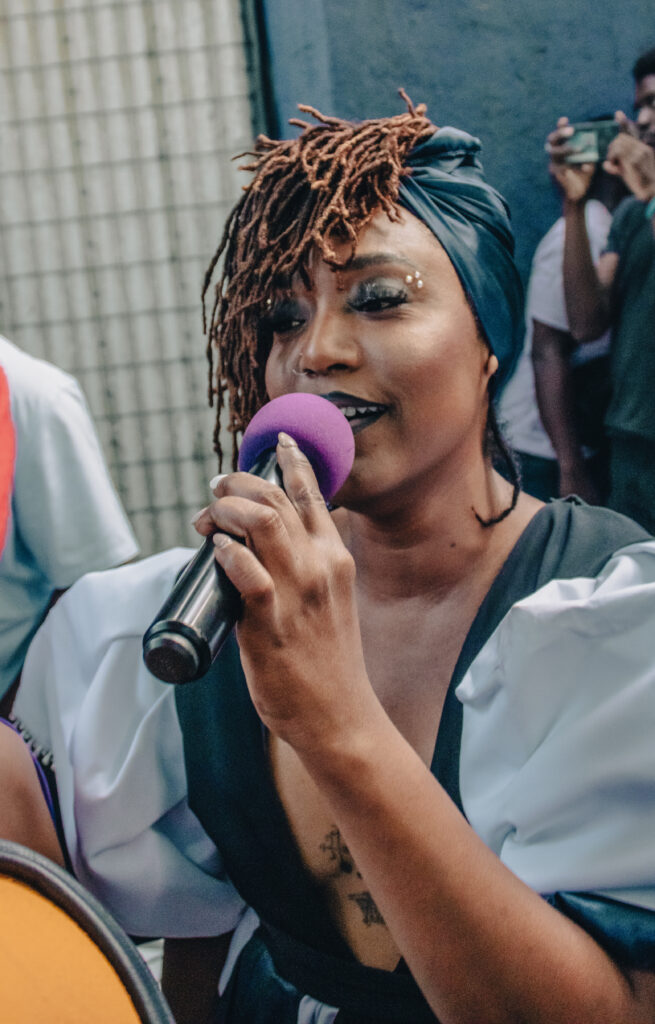This post is also available in: Kreyol
The situation of the country cannot prevent us from creating. We must continue to create, because it is from creativity that we live. Creativity is our oxygen. Ayibobo.
CHARLINE JEAN GILLES
Port-au-Prince, Haiti
(This conversation was originally held in Kreyòl)
Charline Jean Gilles is a formidable Port-au-Prince-based artist who’s been creating for over 15 years in theater, song, and cultural preservation. Charline now has a new musical collaboration with the artist and guitarist Toussaint Jimmy Kerby called NANM — celebrating Haiti’s musical heritage and a must-see if you have the opportunity to catch them on a stage near you. We had a chance to talk to her to learn about her artistic journey and find out what’s in store for the NANM project.
People who know you from various projects, from music to theater. We would love to know when and how you started?
My goodness, this question makes me laugh so much because to answer it, I am finding it necessary to verify a series of dates. That said, I basically started singing and doing small plays in church. As a professional – meaning someone who sings, does theater and is paid for their work – I started in 2007 with Gaëlle Bien-Aimé. Our troupe was called Corps et Âme (Body & Soul). We played in a musical called Don Juan.
In late 2007, early 2008, I continued with Notre Dame de Paris directed by Bertrand Labarre, Maître Dechamps, and Stevenson, with choreography by Jean-Réné Delsoin. Rehearsals for that show took eight months. In short, it was in 2007 that I became a true professional in music and theater.
In a video you shared on your TikTok, you mentioned growing up in church. In your work, we see that Vodou plays a big role both in the music and in the aesthetic. Can you talk about your transition, if we can call it that, between these two completely different worlds?
Woy Magazine, with this question, you make me laugh once more! It is a tricky question because it is very dangerous to talk about my transition from the church to the person I am today, and I don’t want to say anything out of turn that would bring prejudice. There are also things I don’t want everyone to know.
I did grow up in the church. But “growing up in the church” sounds like your mother and father took you to church. That was not the case for me. In fact, my mother used to spank me when I used to come home too late from church or for staying at church services for too long. I used to really get in trouble over the church, but I was always drawn by a mystical force that I couldn’t really explain.
I felt that there was more than what I saw, more than the way it was presented to me, and I was searching, asking questions. I have come to understand that I had a spirituality inside me, something inside me, a light that I was searching for. Since the church was all I knew, I was very religious.
A transition took place and I realized not long ago that my spiritual journey began before I was even aware of it. But, it came together right on time and I feel good about it.
Recently, we discovered the NANM project that you are doing in collaboration with Toussaint Jimmy Kerby. How did this project begin? And will it continue in the future?

Photo credit: NANM
Ayibobo for this question. NANM is not a project in which I am in collaboration with – it is the culmination of two different projects that have merged to become one. On the one hand, it was Toussaint Jimmy Kerby’s thesis project for ENARTS art school, which had as a goal to integrate melodic instruments with the drums and rhythms of the lakou.
For myself, the goal was to work on Vodou music, on the texts especially, on the articulations, on the role of the songs, to show that we can sing Vodou. That the songs are beautiful and that we can sing them well and articulate them well. Certainly, a lot of the songs are coded in message. But what people have to understand, they will understand because the pieces are very difficult to sing, and the chords are complex. But they have a lot of depth; they have soul.
So that was my project. The aim was also to restore certain choruses, choirs, and peristyles in the lakou. To make the lakou rediscover another way of appreciating the music when they sing it so that they can internalize the soul and the meaning that lies within the music.
Kerby and I met, we joined together and decided to make this beautiful project.
The socio-political and economic situation of the country is complicated, and it affects both the creations of artists and their performances. How do you replenish yourself to keep moving forward? Where do this strength and vigor come from? What enables you to be an artist in this country?
I am an artist, a singer, and an actress. I also do physical therapy. I’m a makeup artist, an administrator, a linguist, and a master of ceremonies for weddings and other events. But all of the fields I just mentioned are affected by the socio-economic situation of the country. There are no gigs.
I don’t know, but maybe it’s a survival instinct, I would call it. And then there are Ginen that surround us, who are making sure we find what we need to survive, what we need to move forward – because things are in fact complicated.
I am not only an artist; I am also a mother. I have a 12-year-old daughter as well as a niece. We live together, and things are difficult. The most complicated thing is creating in the context where there are two children who want to go to school, who want to go out, and who are tired of staying home.
There are times when you would like to do certain things with them, but financially, there are things you cannot afford. On the one hand, it’s a good thing, because you discipline them too. But it’s complicated.
I don’t think I can tell you how I recover, but the only thing I can say is that I have to move forward. I have no right to stop. Because every step I take, I am not moving forward for me. I’m moving forward for my children. I’m moving forward for the people around me. I’m moving forward for a whole country. For the small number people in my community who know of me to say that this woman left something behind.
Sometimes you feel like letting yourself go. You cry in the middle of the night all alone but the next morning you have to stand up again because you have to move forward.
We saw you on the Liminasyon – Bazou project and we discovered your project called NANM. What other projects should we expect to see you in? Do you have projects you are working on at the moment?
I was on the Liminasyon project as a singer, and yes, it is a wonderful project. You will be able to discover it, but NANM is our project; it is our baby. It is very important to emphasize that NANM is not only me but both Kerby and Charline. I am NANM, NANM is me.
We have an upcoming concert in collaboration with FOKAL. It’s a live concert coming out very soon. We are also in collaboration with other companies for other live concerts.
We are working on a project on Gede as well. We would like to release a nice little project produced in studio that we will share on the NANM pages. That’s why we always encourage people to subscribe to our pages. On YouTube you will find us at NANM, on Facebook it is @nanmvodoua, for Instagram it is @nanmvodoua.
There are other projects coming up, especially with Gaëlle Bien-Aimé. And we are working on another project with FOKAL despite confinement. It is a project called Dekonstriksyon that has spread over 2 years. We are currently at the stage of artistic creation. I believe there will be performances especially in the upcoming festivals.
We also have other projects in the works with other people and there are personal projects too so there are many things in the works and you will surely see me again.
The situation of the country cannot prevent us from creating. We must create in order to live, because it is from creativity that we live. Creativity is our oxygen.
Ayibobo.
Feature Photos by Cassendy Lafond for Woy Magazine


